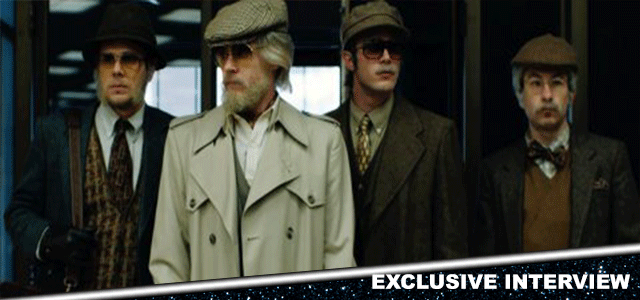
How do you distinguish truth from fiction? That's the question lurking at the heart of compelling new movie American Animals, one that brings to life the astonishing true story of the 2004 Transylvania University heist.
American Animals is the story of four disaffected students in Kentucky who take the audacious step of heisting a book of priceless wildlife paintings by the painter Audubon from their high security university library. The movie mixes a cinematic reconstruction with talking heads footage of the real-life criminals, each of whom offer differing testimonies as to how exactly everything went down.
With a dynamic young cast including American Horror Story's Evan Peters and Dunkirk's Barry Keoghan, the movie has style and intelligence to burn. We were delighted to catch up with director Bart Layton, a BAFTA winner for his acclaimed 2012 docudrama The Imposter (which similarly played around with notions of fact) to discuss the making of his new movie.
So, when I saw this movie, I went in cold, with no expectations as to the story, and it completely blew me away. Bearing in mind the themes of disillusioned youth and the seemingly fickle nature of what constitutes the truth, did you set out to make a film that captures the age in which we're currently living?
Definitely, I think that's a great question. I suppose the reason I wanted to tell the story is because we're in a culture where we can all have our own TV channel, essentially. We're all broadcasting constantly, and the notion of celebrity seems within reach in a way that's very different to when I was growing up.
There's something about being average that is not OK anymore. There's a pressure to be a somebody - that's why we've got the strap line on the poster, 'Nobody wants to be ordinary'. A lot of what's driving the characters in the film, and their crime, is they've got to leave a mark on the world, even if it's not a good one. Also themes of masculinity and so on that I thought could still be explored through this fun caper.
This is your first film since winning a BAFTA for The Imposter, which was terrific. What made you choose this as a follow-up project?
I got offered a lot of big, conventional movies after The Imposter, which was very flattering and very unexpected. But I didn't find anything particularly original about them. They felt like the kinds of movies I might watch on a plane.
I also had that slight itch to scratch: is there another way of telling a true story? You know, you usually get the 'based on a true story' thing followed by the photographs at the end of the film and it's always a question as to how much has been made up. Can something be both a documentary and a movie kind of movie? It's an experiment that I wanted to get out of my system. I just needed to see if this could work.
Both this and The Imposter mix talking head interviews with the dramatisation approach that deliberately confounds expectations as to what's true and what isn't. I wondered, as a director, what is your responsibility to the truth?
A great question. I think, in documentary, you have a very great responsibility toward the truth. I think it all comes down to the contract you make with the audience. What is the expectation?
In a documentary, there's a real expectation that one is getting the truth, but then that notion of documentary truth is in itself a very grey area. Making a film is a hugely subjective process. No-one sets out to make a boring film, so by virtue of trying to make it interesting and trying to pass that information in a certain way, that is a manipulative process.
So, I guess for me, it's about laying the cards on the table. With American Animals, we announce at the very start that this is a true story, but, crucially, you've got unreliable narrators, from whose memories this is drawn. As long as I'm honest with you as to what it is we're doing with the film, what kind of entity we're making, that's the point.
The notion of the robber and the heist is something that's captivated filmmakers since time immemorial. What do you think it is about the romance of the heist that continues to occupy cinema?
I think it's a couple of things. One is, I think we all wonder what it would be like to commit a robbery ourselves. Also, in most heist movies, we find a way to sympathise with the characters. Early on in Ocean's Eleven, we're giving Danny Ocean an excuse as to why his heist is acceptable because the guy stole his wife and the guy's an asshole and all the rest of it. We get to play along vicariously, but also, I think that, structurally speaking, the heist movie is a really great device.
It introduces the characters in a really organic way, they're recruited, the planning of the robbery means we get to watch them case the joint, assemble the team and, finally, pull off the job. You've got an in-built, what-happens-next scenario. You're asking yourself how is this going to play out? It lends itself to a very convenient narrative in that way.
The fascinating thing about this film is what's being stolen isn't money but a book of priceless wildlife paintings. It's culture and art that's being robbed. What did you make of that when you first came across the story?
Well that's something that plays an important thematic role in the movie. Hence the title as well – there's a reference to Darwin, and a reference to evolution, the fact that we have now evolved beyond the Darwinian sense. We're now consumers. Also, the wilderness - that's what these kids are longing for. An experience of the wild to find out who they are and what they're made of. The painter, Audubon, on the other hand, went into the wilderness to paint birds.
I loved the opening shot, which is of the town yet flipped upside down, our expectations turned on their head. There's that sense of familiarity being turned over. There's something romanticised about America isn't there?
Totally. I think more for us here in Britain. I guess it's the way they see our royalty and our ancient history. Whereas our version of that is modern Americana with all those strip malls, pancake houses and all that kind of stuff.
The soundtrack is another pivotal character in the film. I loved the use of Rodríguez over the end credits, which of course comes from Searching for Sugar Man, a fantastic documentary.
That was partially a homage to Malik. Because when I was at Sundance with The Imposter in 2012, Malik was there with Searching for Sugar Man. He tragically died before he could make another film, so it was a way of nodding to him. Also, the song seemed so appropriate.
Using music to drive the story forward, is that something you prioritise?
Yeah, the choice of songs has very little to do with lyrics, I find. It's all to do with whether the track is supporting and driving the emotional purpose of the scene. Is it accentuating it or echoing it? It's got to be reflective of the intention of the scene.
You've lined up some enormously talented young actors in this movie, among them Evan Peters from American Horror Story and Barry Keoghan from Dunkirk. What is the process in directing them to honour the real-life characters they were portraying?
To be honest, there was a little bit of disagreement. Evan, for example, is almost kind of method in his approach and really wanted access to the real guys. And I didn't want the actors to have access. I felt like I'd put it all in the script and also, the guys involved are now 10 years older. They've spent time in prison. Hanging out now to learn how to portray you as a younger man would be of minimal use. I wanted the actors to find their own versions of the characters.
Both of your movies share this interest with the American interior, with these small towns harbouring crushed dreams and aspirations. What is it about that landscape that fascinates you as a filmmaker?
Great question. The next movie I'm doing is also set in that world. I guess I watched too many movies as a kid. There's something about the iconography of that landscape. Things happen in those places that are emblematic of bigger stories, particularly in America. There are things that happen in the US that don't happen in the UK. The thing that comes first is the story and often those stories tend to happen in these places.
The film starts in 2003 in this pre-social media age and when I was watching it, I was thinking this is like a glimpse into a completely different era in human history. What do you think that does dramatically for the story?
I wanted it to be as non-era-specific as possible, in a way. Because I feel like the story's more relevant now, because of social media, because we have to tell the world how interesting we are. So, in a way, it's a pre-social media story about a post-social media world. I perceived that pressure, not just on young people, but also on everyone – that desire to be noteworthy.
I was interviewed by a young college journalist recently in Seattle and she said her and her friends found the movie very affecting. The reason was, if they didn't have a Wikipedia page by the time they're 40, does that mean they're a nobody? It's not just about the nice house and nice car. It's all about whether someone will be remembered.
Click here to book your tickets for American Animals, opening in Cineworld from this Friday. Don't forget to tweet us your responses to both the movie and interview @Cineworld.
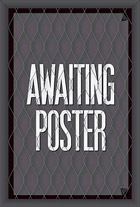
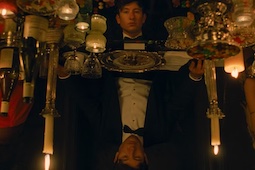
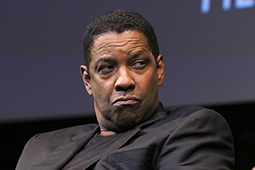
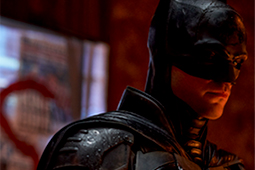
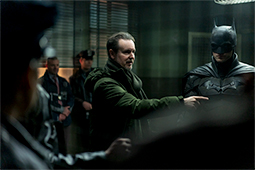
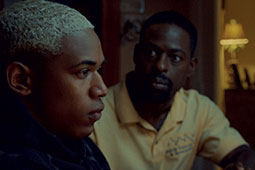


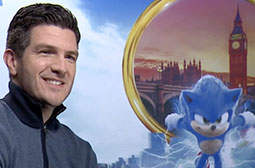
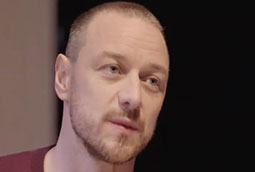
.jpg)


.jpg)
.png)






